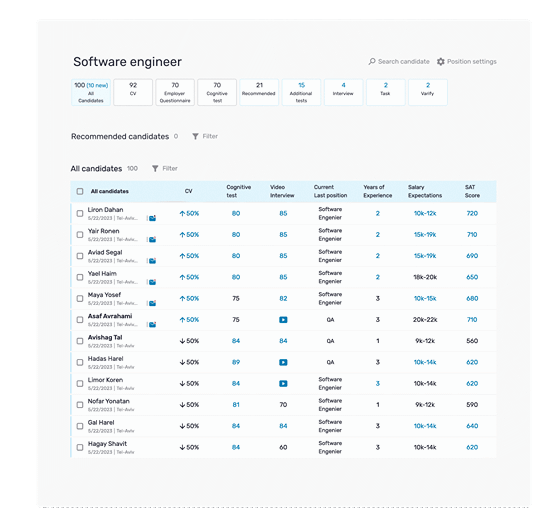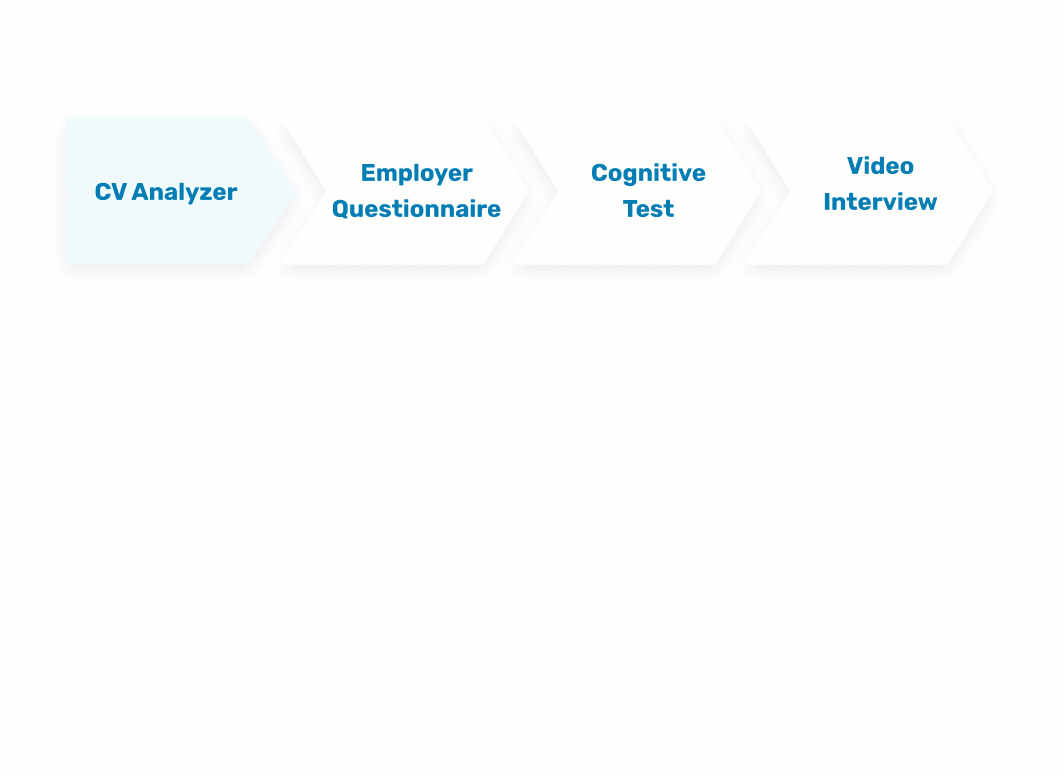 How AI in Recruitment Trends Is Revolutionizing the Future of Hiring
How AI in Recruitment Trends Is Revolutionizing the Future of Hiring
AI in recruitment trends are rapidly transforming how organizations attract, assess, and hire talent, ushering in an era defined by efficiency, personalization, and strategic insight. As we approach 2026, the future of hiring is increasingly shaped by recruitment innovation powered by artificial intelligence, with new capabilities emerging at every stage of the hiring journey.
The Evolution of AI in Recruitment Trends
AI Trends in recruitment have evolved from simple automation tools to sophisticated systems that fundamentally change talent acquisition. Early AI applications focused on automating repetitive tasks, such as resume screening and interview scheduling. Today, AI is driving recruitment innovation by enabling predictive analytics, hyper-personalization, and unbiased candidate assessments, positioning itself as a strategic partner in workforce planning
From Automation to Augmentation:
- Automation: Initial AI tools streamlined administrative tasks, reducing time-to-hire and freeing recruiters from manual processes.
- Augmentation: Modern AI systems now augment human decision-making, offering real-time insights, predictive guidance, and strategic recommendations that enhance recruiter effectiveness.
Key AI in Recruitment Trends Shaping 2025 and Beyond
1. Predictive Analytics and Workforce Planning
AI in recruitment trends are increasingly defined by predictive analytics. AI tools analyze historical hiring data, market trends, and internal workforce metrics to forecast talent needs before they become urgent. This proactive approach enables organizations to build talent pipelines, anticipate attrition, and align hiring with business objectives.
- Workforce Planning: AI identifies future skills gaps, suggests high-potential candidates, and informs strategic hiring decisions.
- Candidate Success Prediction: Machine learning models assess resumes, skills, and past performance to predict a candidate’s likelihood of thriving in a role.
2. Hyper-Personalization at Scale
One of the most significant AI trends in 2026 is hyper-personalization. AI customizes every aspect of the candidate journey, from dynamic application processes to personalized outreach and assessment pathways.
- Candidate Journey Customization: AI tailors application experiences based on individual backgrounds and preferences, increasing engagement and satisfaction.
- Personalized Job Recommendations: AI matches candidates with roles that align with their skills and career goals, improving fit and retention.
3. Enhanced Candidate Experience
Recruitment innovation is also evident in the way AI elevates candidate experience. AI-driven chatbots, automated follow-ups, and virtual onboarding modules keep candidates informed and engaged throughout the process.
- Conversational AI: Next-generation chatbots handle complex queries, schedule interviews, and provide real-time updates, ensuring seamless communication.
- Virtual Onboarding: AI creates interactive onboarding experiences for remote hires, fostering connection and productivity from day one.
4. Bias Reduction and Diversity Initiatives
AI in recruitment trends are addressing longstanding challenges around diversity and inclusion. By anonymizing resumes and standardizing assessments, AI helps organizations reduce unconscious bias and promote fair hiring practices.
- Blind Screening: AI removes identifying information from applications, ensuring candidates are evaluated solely on their qualifications.
- Inclusive Job Descriptions: AI analyzes job postings for biased language, suggesting neutral alternatives to attract diverse talent.
5. AI-Assisted Upskilling and Internal Mobility
The future of hiring is not just about external recruitment but also about developing and mobilizing internal talent. AI identifies skill gaps, recommends personalized training, and matches employees to new opportunities within the organization.
- Upskilling Programs: AI-driven platforms suggest targeted learning resources based on future job requirements.
- Internal Talent Matching: AI surfaces internal candidates for open roles, reducing external hiring costs and supporting career growth.
6. Immersive and Objective Assessments
AI trends in 2026 include the rise of immersive assessments, such as video interviews analyzed by AI for communication skills, problem-solving, and cultural fit. These tools provide objective, data-driven insights that enhance decision-making.
- Video Interview Analysis: AI evaluates speech patterns, facial cues, and responses to assess competencies and fit.
- Skill-Based Assessments: Custom AI-driven tests measure job-relevant abilities, ensuring candidates meet role requirements.
7. Strategic Talent Intelligence
Advanced AI platforms aggregate data from multiple sources, such as social media, professional networks, and internal HR systems, to provide a holistic view of the talent landscape. This strategic intelligence informs everything from sourcing to compensation strategies, making recruitment a driver of organizational success.
- Market Analysis: AI delivers competitive insights on talent availability, compensation trends, and emerging skillsets.
- Proactive Sourcing: AI identifies and nurtures passive candidates, building robust talent pipelines for future needs.
How AI in Recruitment Trends Are Redefining the Recruiter’s Role
Rather than replacing recruiters, AI is transforming their roles into strategic talent advisors. Recruiters equipped with AI tools can focus on relationship-building, employer branding, and high-value decision-making, while AI handles data processing and routine tasks.
- Context-Aware Assistants: AI surfaces relevant candidate information and suggests interview questions in real time.
- Decision Support: AI synthesizes feedback, provides recommendations, and highlights areas for deeper exploration, empowering recruiters to make informed choices.
The Future of Hiring: What to Expect by 2026
1. Hyper-Personalization
By 2026, over 75% of large enterprises are expected to employ hyper-personalization in recruitment, delivering unique experiences to every candidate. This shift will drive higher engagement, better fit, and improved retention.
2. Augmented Intelligence Becomes Standard
AI trends in 2026 point toward “augmented intelligence,” in which AI and human judgment work in tandem. The most successful organizations will balance automation with the human touch, ensuring efficiency without sacrificing candidate relationships.
3. Proactive and Strategic Talent Acquisition
Recruitment innovation will see AI-driven talent intelligence platforms guiding strategic workforce planning, enabling organizations to anticipate needs and stay ahead of competitors.
4. Ethical and Transparent AI Use
As AI becomes more embedded in hiring, ethical considerations around transparency, fairness, and privacy will take center stage. Organizations will need to ensure their AI systems are explainable, unbiased, and compliant with evolving regulations.
5. Continuous Learning and Upskilling
The future of hiring will require ongoing investment in employee development. AI will play a central role in identifying skill gaps, recommending training, and supporting lifelong learning initiatives.
Recruitment Innovation: Challenges and Considerations
While the benefits of AI in recruitment trends are clear, organizations must navigate several challenges to maximize value:
- Data Quality: AI is only as effective as the data it analyzes. Ensuring accurate, comprehensive, and unbiased data is essential for reliable outcomes.
- Change Management: Adopting AI requires cultural change, upskilling recruiters, and redefining processes to leverage new technologies.
- Candidate Trust: Transparency about AI’s role in recruitment is vital to build trust and ensure a positive candidate experience.
AI in recruitment trends are no longer a futuristic concept – they are the new reality defining the future of hiring. As organizations embrace recruitment innovation, the focus will shift from transactional hiring to strategic talent acquisition, powered by data, personalization, and augmented intelligence. The most successful companies will be those that blend cutting-edge AI capabilities with human insight, creating hiring processes that are efficient, equitable, and deeply engaging.
Looking ahead to AI trends 2026, the question is not whether AI will transform recruitment, but how quickly organizations will adapt and how thoroughly they will integrate these technologies into their talent strategies. By staying ahead of these trends, businesses can secure the talent they need to thrive in an increasingly competitive and dynamic marketplace.
Unlock the Future of Hiring with AI Recruitment
The landscape of talent acquisition is changing fast – and AI trends in recruitment are leading the way. Imagine a recruitment process where automation, intelligence, and human insight work together to help you find the best talent, faster and smarter than ever before.
AI Recruitment is built for the next era of recruitment innovation:
- AI-driven recruitment helps you identify and engage the best candidates faster and smarter than ever before.
- Seamless automation of resume analysis, intelligent candidate ranking, and one-click job postings streamline the hiring process.
- Embrace recruitment innovation by leveraging AI in recruitment trends to eliminate busywork and focus on building meaningful relationships.
Ready for the future of hiring? Let AI in recruitment empower your team to make strategic, data-driven hiring decisions!


FAQs
AI improves candidate experience by streamlining and personalizing every stage of the hiring journey. It offers tailored job recommendations based on a candidate’s skills and preferences, uses chatbots and virtual assistants for instant communication and interview scheduling, and automates repetitive tasks like resume screening. AI also provides real-time updates and feedback, ensuring candidates are always informed and engaged, while minimizing delays and frustrations. These enhancements make the process faster, more transparent, and more engaging, leading to a positive overall experience for job seekers.
AI-powered applicant tracking systems (ATS) offer significant advantages over traditional systems. They automate manual tasks such as resume screening, candidate ranking, and interview scheduling, which accelerates the hiring process and reduces administrative burdens. AI-powered ATS solutions also leverage predictive analytics to identify top talent, deliver personalized candidate experiences, and provide actionable insights for recruiters. This results in smarter, data-driven hiring decisions, improved candidate engagement, and greater efficiency throughout the recruitment process.
Today, AI is used in recruitment to automate sourcing and screening, analyze resumes and applications, conduct pre-employment assessments, and facilitate personalized candidate communication. AI-driven chatbots handle candidate inquiries and scheduling, while algorithms match candidates to roles based on qualifications and preferences. AI also supports diversity initiatives by anonymizing applications and identifying biased language in job descriptions, helping organizations build more inclusive teams.
AI is fundamentally transforming the future of hiring by moving recruitment from a process supported by automation to one that is increasingly AI-driven. This includes fully automated sourcing, assessment, and onboarding, as well as the use of predictive analytics for workforce planning. AI enables organizations to reach a broader talent pool, make unbiased decisions, and streamline operations, leading to faster, smarter, and more inclusive hiring processes. The future of hiring will be defined by the seamless collaboration between AI and human recruiters, with AI handling data-driven tasks and humans focusing on strategic decision-making and candidate relationships.
AI trends for 2026 include the rise of hyper-personalization, where every candidate receives a uniquely tailored experience; the advancement of augmented intelligence, with AI and human recruiters working in tandem; and the adoption of fully autonomous hiring workflows.
AI will drive strategic talent intelligence, support continuous upskilling and internal mobility, and further automate and personalize onboarding. Transparency, fairness, and ethical AI use will also become central as organizations strive for unbiased and explainable hiring practices.
AI helps reduce bias by anonymizing applications, standardizing candidate assessments, and detecting biased patterns in hiring data. Algorithms can be trained on diverse datasets to avoid reinforcing historical prejudices, and fairness constraints can be implemented to ensure balanced outcomes. Transparent AI models allow stakeholders to understand and audit decision-making processes, while human-AI collaboration ensures that final decisions are both data-driven and contextually sound, further minimizing the risk of bias in hiring.
AI identifies skill gaps within the workforce, recommends personalized training programs, and matches employees to internal opportunities for growth. By analyzing career trajectories and future job requirements, AI-driven platforms suggest relevant learning resources and facilitate continuous development. This supports internal mobility, helps organizations adapt to changing business needs, and ensures employees remain competitive in a rapidly evolving job market.


